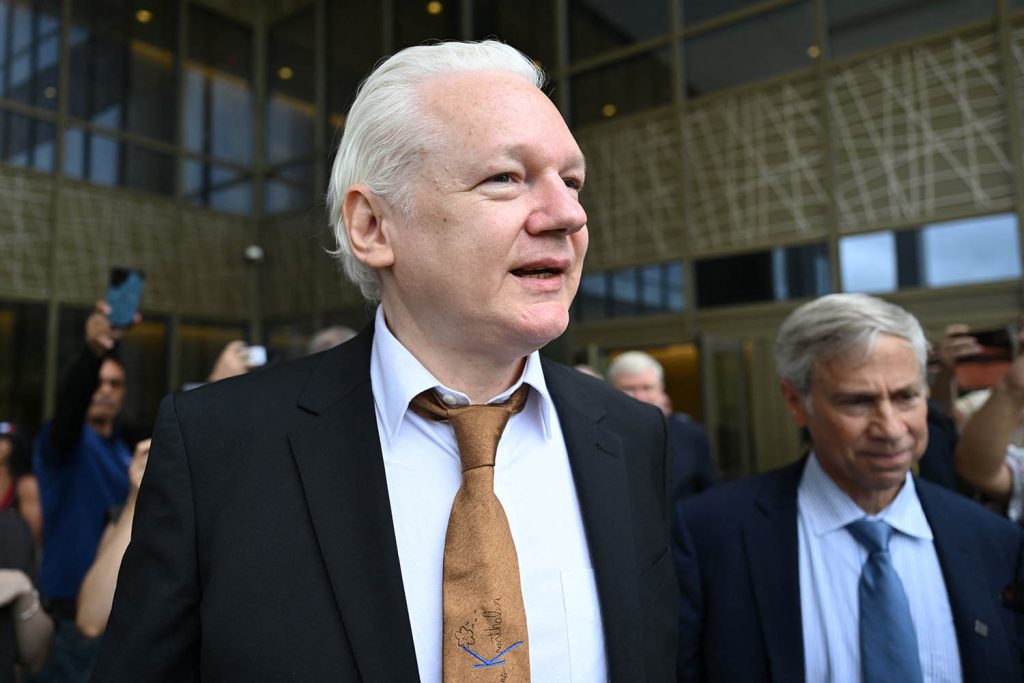
After a saga spanning 14 years, Julian Assange, the Wikileaks founder and scourge of American national security, has finally appeared before a US federal judge. At around midnight UK time, on a Pacific island midway between Japan and Australia, he pleaded guilty to a single offence under the US Espionage Act of “conspiring to unlawfully obtain and disseminate classified national defence information”. The 52 year-old Australian was sentenced to time served – and immediately freed, having served more than five years in a UK prison as he fought extradition to the US. Assange now returns to his native Australia to be united with his wife and their two children, born while he was in judicial limbo. It’s unclear if he will be thought of as a hero or a villain. But the US saves face with his guilty plea.
What should we think about Assange and his release?
He’s certainly hard to like. I spent a couple of hours with him one day in late 2010 at a bolthole in Norfolk where he was orchestrating the release of hundreds of thousands of leaked US diplomatic cables. He was quick-witted and combative, and didn’t much want to do business with a newspaper that had criticised him and his methods. He was charged in Sweden with rape and sexual molestation – charges that were later dropped because of the passage of time; he spent seven years in London’s Ecuadorian embassy having been granted asylum there.
“Mercurial, dislikeable, erratic, narcissistic,” is how Alan Rusbridger the former editor of The Guardian remembers him from the era when they co-published damning secrets of US operations in Iraq and Afghanistan.
But the Iraq and Afghanistan era leaks were massively in the global public interest, revealing the truth of a chaotic US operation, including the cover up of friendly fire deaths, the degrading abuse of prisoners and shining a light on the population of detainees held at Guantanamo Bay.
The leaked diplomatic cables published in 2010 were embarrassing for the US, but not top secret – covering decades of unguarded commentary by US Embassy staff, sent to Washington DC from their posts around the world.
The Democratic Party leaks of 2015 were different – the source of the leak has never been definitively revealed – but it’s hard to escape the view that Wikileaks was used by Russia to release hacked material to destabilise the US during the 2016 election cycle in a way that helped Donald Trump win.
Chelsea Manning, the US army intelligence analyst who leaked the material from Iraq, broke US law. But did Assange? He may not have given much thought to the duty of care he had to a source, but he did what journalists do, in cultivating and encouraging someone to hand over information.
At the time of his greatest impact, established media outlets struggled to recognise Assange as a journalist, but it’s clearer now. He was a shapeshifter – sometimes a journalist, sometimes an activist, sometimes a source, sometimes a conduit. He played overlapping roles, often performing them at the same time.
Ethically, he played by different rules – adopting a policy of publishing everything in an unredacted way put the lives of human sources at risk in countries like Afghanistan.
He was a difficult person, who performed some services that were strongly in the public interest and some that were not.
In 2019, Alan Rusbridger wrote a piece about Assange for Tortoise in which he warned: “The battles for liberty and free speech have often been won by unsavoury characters… we may not like or respect them, but there may well be occasions when we have to defend them.”










